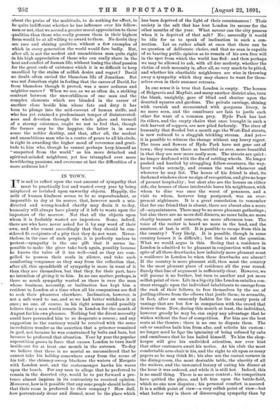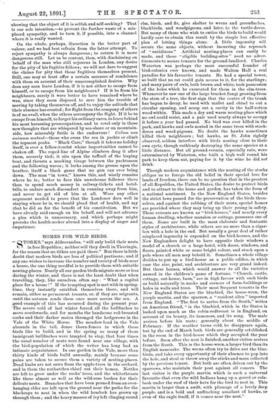IN TOWN.
TT is sad to reflect upon the vast amount of sympathy that must be practically lost and wasted every year by being -misplaced or lavished upon unworthy objects. Happily, the milk of human kindness seems to be so superabundant, so impossible to dry at its source, that, however much a mis- directed and wrong-headed charity may drain it to-day, 'humanity will always have plenty of it left to waste upon the impostors of the morrow. Not that all the objects upon whom it is foolishly wasted are impostors. Some, indeed,
'there are who have never asked for it by any word of their -own, and who resent exceedingly that they should be con- midered fit recipients of a pity that they do not want. Never- theless, in the case of such people, it is perfectly useless to protest—sympathy is the one gift that it seems im- possible to make the giver take back again, possibly because he knows the value of it too well—and so they are com- pelled to possess their souls in silence, and take such comforting vengeance as they may from the reflection that, after all, this spendthrift of sympathy is more in want of it than they are themselves, but that they, for their part, have no intention of giving it to him. In no one matter, perhaps, is there so much sympathy wasted as there is over the man whose business, necessity, or inclination has kept him a resident in London at a time when all his companions are fled to seek their pleasures elsewhere. Inclination, however, is not a safe word to use, and so we had better withdraw it at once ; no one, of course, in his right senses could possibly believe that a man would remain in London for the month of August for his own pleasure. Nothing but the direst necessity could have persuaded him to so desperate a course ; and any suggestion to the contrary would be received with the same incredulous wonder as the assertion that a prisoner remained in gaol, not because he was constrained by bolts and bars, but because be preferred that situation. Year by year the popular superstition grows in force that causes London to turn itself inside-out for at least one month in the autumn. To-day we believe that there is no mortal so unconsidered that he cannot take his holiday somewhere away from the scene of his toil : the chimney-sweep blackens the waters of Margate with London soot, and the costermonger hawks his wares upon the beach. For any man to allege that he preferred to remain in the deserted city, would be to put forward a pre- tence almost impious in its contrariety to received opinion. Moreover, how is it possible that any sane people should believe that their room is preferred to their company ? How dull, how portentously drear and dismal, must be the place which has been deprived of the light of their countenances ! Their society is the salt that has lent London its savour for the other months of the year. What savour can the city possess when it is deprived of that salt P No ; assuredly it would be idle for us to speak of inclination in such a con- nection. Let us rather admit at once that there can be no question of deliberate choice, and that no man is capable of so braving public opinion as to remain of his own free will in the spot from which the world has fled : and then perhaps we may be allowed to ask, with all due modesty, whether the victim of such necessity is, after all, so very much to be pitied, and whether his charitable neighbours are wise in throwing away a sympathy which they may chance to want for them- selves even in their slimmer retreats.
In one sense it is true that London is empty. The houses of Belgravia and Mayfair, and many another district also, turn the blank, unsightly, gaze of blind and shutter upon the deserted squares and gardens. The private carriage, shining with varnish and surmounted with gorgeous livery, is no more seen, and the omnibuses are fain to jostle each other for want of a common prey. Hyde Park has lost its riders, and the empty chairs that once brought in such a rich harvest of coppers, are now piled forlornly. The river of humanity that flooded but a month ago the West-End streets, is now reduced to a sluggish trickling stream. And yet— it is possible to witness the change without any heavy regret. The trees and flowers of Hyde Park have not gone out of town ; they remain there as beautiful as ever, more beautiful in that they are now more easily seen. The streets are quiet : no longer deafened with the din of rattling wheels. No longer pushed and hustled by struggling fellow-creatures, the way- farer walks serenely, and crosses the road whenever and wherever he may list. The house of his friend is shut, its darkened windows show no sign of recognition, and give no hope of present hospitality ; but shut also are the houses on either side, the houses of those intolerable bores his neighbours, with whom to dine was once the worst of penances, and a visit to whom, however long postponed, was an ever- present nightmare. It is a great consolation to remember that for one friend that is absent, there are absent also a score of—acquaintances. There may be no more pleasant gatherings ; but also there are no more dull dinners, no more balls, no more charity bazaars and concerts, no more afternoon teas. The voice of the reciter is heard no more in the land, and the amateur, at last, is still. It is possible to escape from this in the country P Very likely. It is possible, though in some country houses it is difficult ; but that is not the question. What we would argue is this. Seeing that a residence in London is admitted to be pleasant in conjunction with and in spite of all these drawbacks, how infinitely more pleasant must a residence in London be when these drawbacks are absent! If the country is more pleasant still, then most the country be the most pleasant place of residence all the year round. Surely that line of argument is sufficiently clear. However, we will pursue it no further, but turn to another and yet more selfish point of view. Life in a big city like London entails a con- stant struggle upon the individual inhabitants to emerge from the ruck of their fellows, to free themselves by the use of jostling elbows from the elbows that jostle them; to scramble, in fact, after an unseemly fashion for the scanty posts of vantage that are but few in comparison with the crowd that desires them. Now, during this month at least, the individual, however greedy he may be, can enjoy any advantage that he wishes without the fear of competition. For him are the best seats at the theatre ; there is no one to dispute them. The cab or omnibus hails him from afar, and solicits his custom : no longer need he fear the ignominy of being refused by cabs and omnibuses that he has hailed himself. To him the shop- keeper will give his undivided attention, nor ever hint that other customers await his notice. At his club the most comfortable arm-chair is his, and the right to sit upon as many papers as he may think fit ; his also are the cosiest corners in the dining-room, the most desirable table, the alacrity of all the waiters, and the unwonted luxury of eating his dinner at the hour it was ordered, and while it is still hot. Indeed, this is no small thing. There is no more contest ; his competitors have quitted the place, and left him upon the battle-field, which no one now disputes ; his personal comfort is assured It is a selfish point of view—a very selfish point of view—but what better way is there of discouraging sympathy than by 13howing that the object of it is selfish and self-seeking P That is our sole intention,—to prevent the farther waste of a mis- placed sympathy, and to turn it, if possible, into a channel where it is really wanted.
On the whole, perhaps, discretion is the better part of -valour, and we had best refrain from the latter attempt. To reject sympathy is always dangerous ; to return it is more dangerous still. Let us be content, then, with disclaiming on behalf of the man who still sojourns in London, any desire for the pity of his fugitive fellows; we will not dare to suggest the claims for pity that those fugitives themselves present. Still, one may at least offer a certain measure of condolence with them on account of their unaccomplished desires. Why does any man leave London, if it is not either to escape from 'himself, or to escape from his neighbours P If it be from his neighbours, surely it were better to have remained where he was, since they seem disposed to save him the trouble of moving by taking themseves off, and to enjoy the solitude that -their absence has created ; for flight from the company of others is of no avail, when the others accompany the flight. If it be to -escape from himself, to forget his ordinary cares, to leave behind his most harassing preoccupations, and to revel only in those new thoughts that are whispered by sea-shore or on mountain- side, how miserably futile is the endeavour ! Ccelum non
• animum mutant—those who cross the sea in yachts or climb the topmost peaks. " Black Care," though it takes no holiday itself, is ever a fellow-tourist whose importunities cannot be .shaken off. The roped line of Alpine climbers drag it after them, securely tied; it sits upon the taffrail of the leaping boat, and thrusts a mocking visage between the yachtsman and the following waves ; it lurks among the grouse upon the heather, itself a black game that no gun can ever bring -down. The man "in town," knows thie, and wisely remains where he is ; better to face this unwelcome follower there than to spend much money in railway-tickets and hotel- 'bills, to endure much discomfort in running away from him, and never to get rid of him at all. Were any other argument needed to prove that the Londoner does well in staying where he is, we should plead that of health, and say that he did so for the benefit of his constitution. But we have already said enough on his behalf, and will not advance a plea which is unnecessary, and which perhaps might provoke the health-seeker abroad into a display of anger and impatience.



































 Previous page
Previous page